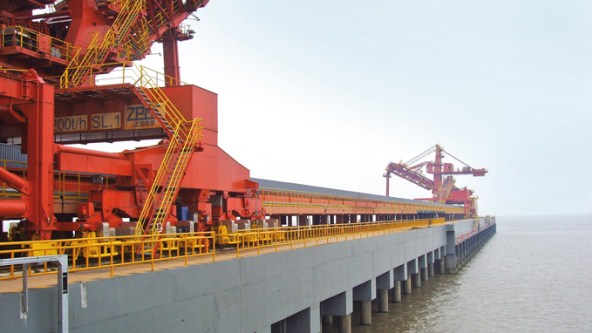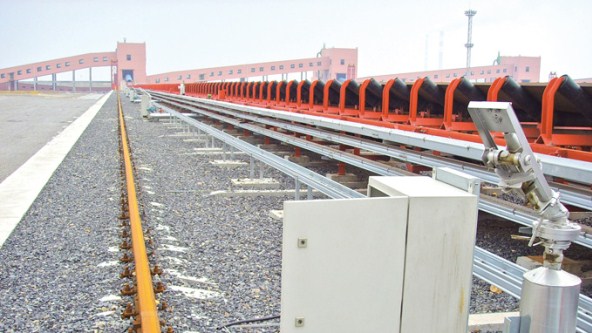I/O for Dust Suppression
In the port of Taicang, an extensive sprinkler system reduces the dust pollution that is caused by shipping iron ore – Turck’s fieldbus modules support the system
Taicang, located in the south bank of the Yangtze River estuary, is the best intersection for river-and-sea coordinated transport. In order to meet the growing iron ore import demand and to provide efficient iron ore transit services in the Yangtze region, the Ningbo Port Group, the Wuhan Iron & Steel Group and the Sinotrans Group established the joint venture of the Taicang Wugang Port Company Limited in 2003. Next to the Ningbo Port, the Taicang Wugang Port will be the second biggest port for the local production of iron and steel. If the port is completed, the annual throughput will be up to 30 million tons.
Sprinkler system against dust
A huge bucket wheel for iron ore works at the bulk material port of the Taicang Wugang Port. A large amount of dust is produced during the shipping process so the operating company decided to install a sprinkler system to reduce the dust impact on the environment. Twenty-one sprinklers on each column are distributed over a length of 800 meters in order to cover the entire area. There are two traditional control methods for the sprinkler system. First, the signals of each sprinkler will be transmitted through cables to a central control unit. This option would allow easy start-up and programming of the system, but laying the countless cables would lead to a substantial increase in cost.
The second method is to equip each sprinkler with a small SPS to achieve control. Although this method could solve the cable problem, a large number of small SPS's would increase the cost and manpower because of the programming required. Also, these local solutions are not ideal for maintenance work. For the system integrator, Shanghai TGE Environment Equipment & Engineering Co. Ltd., in charge of the control system’s installation, programming and commissioning, only a fieldbus solution came into consideration. All advantages of a central control can be used without having the disadvantages of a complex wiring. All signals are collected from I/O stations directly at the sprinklers and are forwarded via Profibus to the controllers.
Flexible BL20 system
After comparing different products, the system integrator chose the BL20 Economy distributed I/O system from Turck. With its modular concept, high signal density, small size and low price per channel, Turck’s fieldbus solution was the clear choice.
Turck's I/O-assistant diagnostic software was another reason for the BL20 becoming the product of choice. The FDT/DTM based tool supports the user during design, start-up and maintenance of the network. With the help of the I/O-assistant, each BL20 station can be configured on-site – without having to be connected to the main controls.
Additional Information
- Automotive
- Inductive Couplers Ensure Precise Material Feed
- Body Detection in Automobile Production
- Reliable Skid Detection in Automotive Production
- Error-free JIS Order Picking for Bumpers
- RFID Bus Mode Ensures Quality of Lithium-Ion Batteries
- Level Measurement in Dip Coating Line
- Level Control in Central Lubrication System
- Quality Assurance on the Gluing Robot
- Tilt angle sensor accelerates platform alignment
- IP67 Hybrid Module Processes Safety Signals
- Decentralized monitoring of cooling stations
- Robot welding cells networked with Ethernet
- Monitoring the cooling circuit on welding clamps
- Flow monitoring in drum washers
- Press Shop
- Body Shop
- Paint Shop
- Final Assembly
- Powertrain
- Item-level Detection with UHF RFID
- Supply of cooling lubricant in machine tools
- Controlling hydraulic pressure in pressing plants
- Measuring process pressure on scissor lifts
- Success Stories - Automotive
- Modular Plant for Flexible and Efficient Production
- Decentralized Safety Technology for Modular Production
- Modular Conveyor System
- RFID and I/O modules for Safe Tool Changes
- Muffler Production Wired with IO-Link Junction Boxes
- Workpiece Carrier Identification in Rear Vent Production
- Weld Nut Sensing
- RFID Traceability
- RFID in Engine Production
- Bumper Production with Identification
- Solutions for Paint Shops
- Welding and Assembly Sensors
- Angle Sensors for Assembly Systems
- Tool Identification
- Unique Products on the Conveyor Belt
- RFID in the Body Shop
- IO-Link Eases Differential Gear Production
- Chemical
- excom I/O System Enables Safe Hydrogen Liquefaction
- Decentralized Automation in Ex Areas
- RFID Control of Tube Connections in the Ex Area
- Ethernet Signal Connection in the I&C Room
- Ethernet-based Automation of Modular Skids
- Ex Isolation in Modular Process Plants
- Detection of Pigs
- Remote Signal I/O
- Easy Connection of Field Devices
- Signal Processing with System I/O in the Control Cabinet
- Signal Separation with Interface Technology in the Control Cabinet
- Identification of Hose Connections
- Efficient Monitoring of Cabinets in the Field
- Monitoring of Quarter Turn Actuators
- Planning and Assembly of System Solutions
- Success Stories
- Efficient Cooling of Industrial Furnaces with Turck's FS+ Flow Sensors
- I/O System Excom Creates Space in the I&C Rooms
- Zone 2 and 22 RFID
- Efficient Testing Control
- Intrinsically Safe Field Communication
- Process Control System Partnership
- Hazardous Area Remote I/O
- Dual Valve Position Feedback
- Flexibility with Fieldbus
- Asset Management with Remote I/O
- Correct Positioning with RFID in Carbid Production
- Fast conversion in restricted space
- Energy
- Food and Beverage
- Dough Thickness Control in Rolling Machines
- Identification of Food Containers
- Detection of Valve Position
- Detection of Pipe Elbows
- Identification of Chocolate Molds
- Success Stories
- Cloud-based Maintenance for Steam Generators
- RFID Support Enables Track and Trace in Food Production
- Grist for the Mill
- Decentralized Control Modules in Cold Storage
- Track and Trace in Meat Production with RFID
- Contact-free Encoder in Potato Production
- UHF RFID in Food Distribution Center
- RFID for Chocolate Production
- Distributed I/O for Food Equipment
- Remote I/O for Distilleries
- RFID and Autoclaves
- Transparency in Chocolate Manufacturing
- IP67 Power Supplies for Conveyors
- Identification in Food Product Storage
- Logistics
- Preventing Package Jams in the Logistics Center
- Tracking Big Bags with RFID
- Access Control for Protected Areas
- Decentralized Muting of Electro-sensitive Protectice Equipment
- Fast Tag Detection at Warehouse Gates
- Preventive Maintenance on Conveyor Belts
- Detection of Transport Containers
- Level Detection in Vessels
- Identification of Cryovessels
- Identification of Mobile Containers with Handheld Devices
- Identification of Food Containers
- Tier 1 – Bumper Identification
- Collision Protection on Reach Stackers
- Success Stories
- Logistics: RFID Reduces Error Quota by 99 Percent
- Sustainable Tracking of RTIs thanks to RFID
- RFID with HF Bus Mode Eases Seed Storage
- RFID Enables Unmanned Store at Major Building Site
- I/O and Safety Modules Increase Throughput in Intralogistics
- Shipment Tracking for Raw Materials
- RFID-based Shipment Control Minimizes Errors
- RFID-based Tracking of Inbound and Outbound Materials
- Decentralized UHF RFID Solution
- Contact-free Encoder in Potato Production
- Decentralized Control Modules in Coldstore
- IP67 Power Supplies for Conveyors
- Modular Conveyor System
- RFID Solution for Warehouse
- RFID Identifies Pharmaceuticals
- UHF RFID in Food Distribution Center
- Mobile Equipment
- Condition Monitoring Sensor Automates Climate Control
- Automatic Slope Compensation
- Distribution Lines for Field Sprayers
- Angle Measurement on a Field Sprayer
- Determining the Boom Angle Position
- Two-Axis Tilt Measurement on a Combine Harvester
- Collision Protection on Reach Stackers
- Success Stories
- RFID Solution with Smart Forklifts in Automobile Production
- Safe Remote Maintenance of Irrigation and Drainage Pumps
- Access Control with RFID System
- Selective Asparagus Harvester
- Position Measurement with RFID and Encoder
- Block I/O Modules on Super Yacht
- Wear-free encoder on hopper dredger
- I/O for Dust Suppression
- Cabinet Cooling
- Quick Disconnect Connectivity
- Automation Solutions for Extreme Cold
- Remote I/O for Cranes
- Rugged Heavy Metal Lifting
- Rollercoaster Positioning
- Mobile Machinery Solutions
- Exact Height Positioning
- Critical Angle Sensing
- Angle Indicator
- Oil and Gas
- Packaging
- Decentralized RFID Package Verification
- Identification of Printing Color Cartridges
- Reliable Operation of Machines
- Monitoring of Caps in Filling Lines
- Monitoring Changeover Processes
- Identification of Test Bottles
- Level Monitoring of Ground Coffee
- Level Detection in Vessels
- Detection of Transport Containers
- Success Stories
- Pharmaceutical
- End-to-End Sample Tracking with RFID
- RFID Control of Tube Connections in the Ex Area
- Decentralized Package Verification
- Automate Modular Skids
- Ex Isolation in Modular Process Plants
- Control of Valve Interfaces
- Monitoring of Quarter Turn Actuators
- Detection of Pipe Elbows
- Easy Connection of Field Devices
- Identification of Cryovessels
- Identification of Mobile Containers
- Identification of Mobile Containers with Handheld Devices
- Identification of Hose Connections for Precursors
- Identification of Hose Connections in Sterile Areas
- Identification of Big Bags and Bioreactors
- Identification of Single-Use Applications
- Success Stories
Select Country
Turck worldwide





